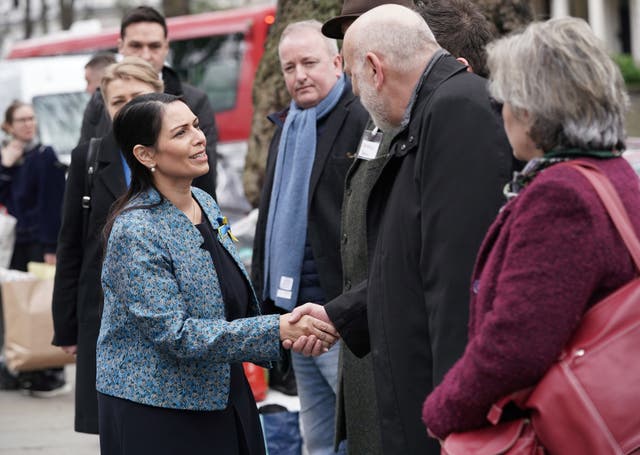
Boris Johnson is set to embark on a week of intense diplomatic efforts with foreign leaders to build a united front against Vladimir Putin, while at home ministers scramble to go “faster and harder” with sanctions levelled against the Kremlin.
The Prime Minister will host Canadian Prime Minister Justin Trudeau and Dutch Prime Minister Mark Rutte at Downing Street on Monday.
Mr Johnson is expected to put more pressure on international leaders to take further action to remove Russia from the Swift payment system, while pushing them to back his six-point plan to tackle Russian aggression.
Meanwhile, Foreign Secretary Liz Truss said amendments to the Economic Crime Bill – which is set to be fast-tracked through all stages in the Commons on Monday – would “give us the chance to bring even more crippling sanctions against Putin and his regime”.
In Ukraine, a second temporary ceasefire designed to allow citizens to escape two cities failed to hold, as fresh photographs showed the desperation of those trying to escape the war.
Russia became more isolated from the West as further companies severed ties with the state.
On Sunday, Tiktok blocked its Russian users from posting new videos and Netflix said it was suspending its service in Russia.
Earlier in the day, American Express said it would suspend services in the country, and PricewaterhouseCoopers (PwC) is separating its firm in Russia – which has a staff of around 3,700 – from the rest of its global network as a result of the invasion of Ukraine.
The UK Government said it would pump an extra £74 million into Ukraine to support the country’s “indomitable people” through the humanitarian crisis being faced on the ground.

The aid, provided through the World Bank, could go towards supporting public sector salaries, allowing vital state functions to keep operating, or supporting social safety nets and pensions for the Ukrainian people.
Meanwhile, Home Secretary Priti Patel wrote to Interpol requesting the suspension of Russia’s access to its systems.
Mr Johnson said: “While only Putin can fully end the suffering in Ukraine, today’s new funding will continue to help those facing the deteriorating humanitarian situation.”
However, the Government will likely come under criticism for the speed of moves made at home.
The Home Office revealed on Sunday that only “around 50” visas had been granted under the Ukraine Family Scheme as of 10am on Sunday.
Shadow home secretary Yvette Cooper tweeted: “This is too slow. Too many hoops for desperate families to have to jump through. Home Office completely failing to understand urgency of crisis.”

But Ms Patel said the UK was “doing everything possible” to speed up efforts to grant visas to Ukrainians fleeing the conflict, and told The Sun she was examining a “humanitarian route” to allow all Ukrainian refugees who want to come to the UK to do so.
In Parliament, Labour is set to put pressure on ministers to further reduce the time period before foreign-owned UK property needs to be registered under new plans.
The party said Russian oligarchs still had a “get out of London free” card as even though the grace period under the measures designed to tackle so-called dirty money had been cut from 18 months to six, the opposition was calling for this to be reduced further to just 28 days.
Shadow business secretary Jonathan Reynolds said: “The invasion of Ukraine and continued Russian aggression demands action now, not in six months’ time.”
But the Foreign Office insisted the new scheme would “allow the Government to move faster and harder when sanctioning oligarchs and businesses associated with the Russian Government”.
The PM said: “Punishing sanctions are meaningless until properly implemented, and these changes will allow us to pursue Putin’s allies in the UK with the full backing of the law, beyond doubt or legal challenge.”
Putin must fail and must be seen to fail in this act of aggression.
We must come together under a six point plan of action to ensure Putin fails in his ambitions.
The world is watching. It is not future historians but the people of Ukraine who will be our judge. pic.twitter.com/mHm0cKAc4H
— Boris Johnson (@BorisJohnson) March 6, 2022
It comes after Mr Johnson, in a nearly 1,300-word essay in the New York Times, said that the West had “failed to learn the lessons of Russian behaviour” that have led to the invasion of Ukraine, the Prime Minister said as he warned world leaders: “We need to prepare now for even darker days ahead.”
Mr Johnson will launch into a week of what No 10 called “focussed engagement” with his global counterparts, starting with Mr Trudeau and Mr Rutte.


Comments: Our rules
We want our comments to be a lively and valuable part of our community - a place where readers can debate and engage with the most important local issues. The ability to comment on our stories is a privilege, not a right, however, and that privilege may be withdrawn if it is abused or misused.
Please report any comments that break our rules.
Read the rules hereLast Updated:
Report this comment Cancel